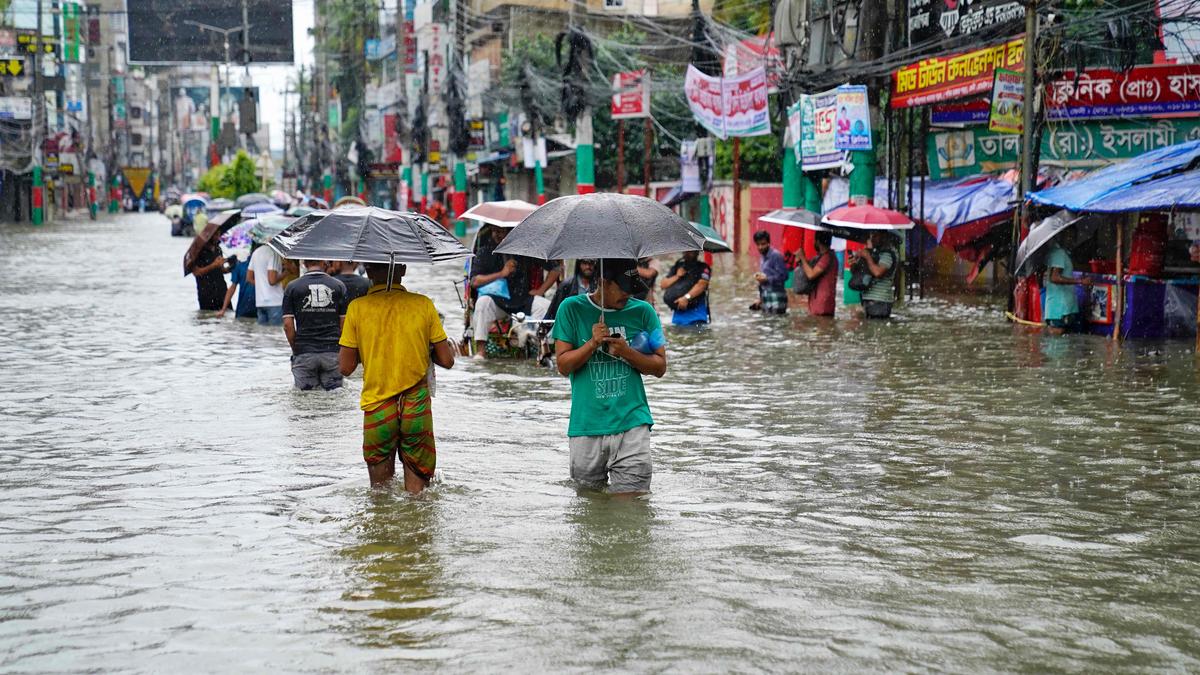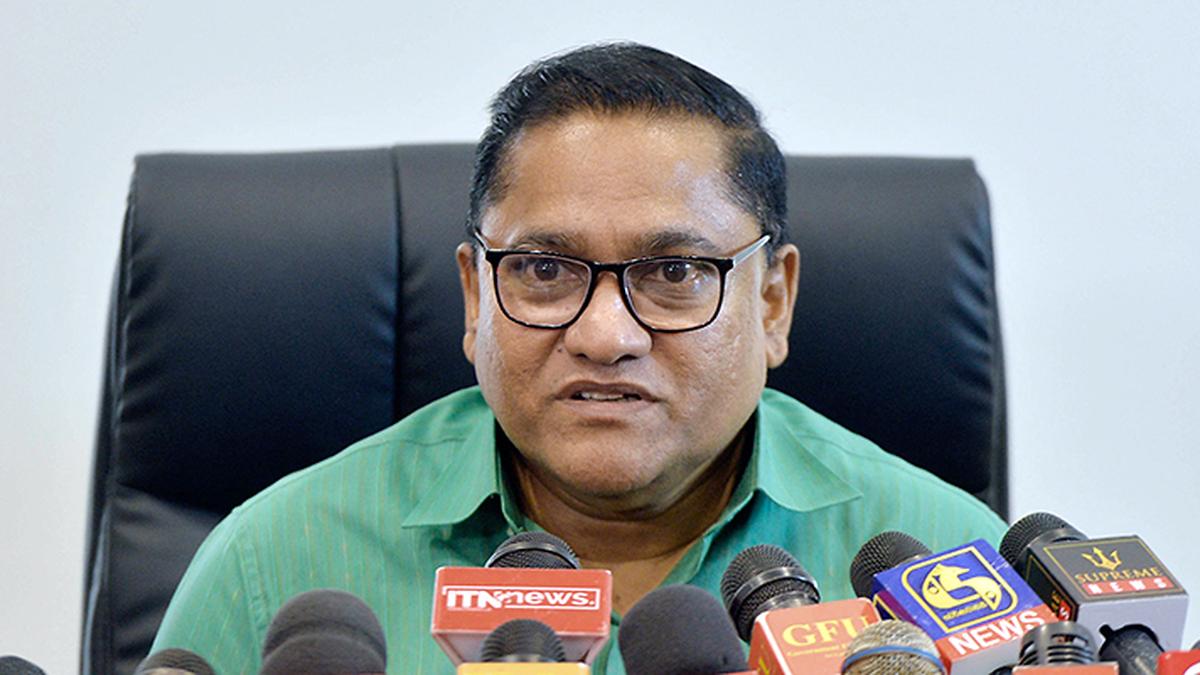The Ministry of External Affairs (MEA) on Thursday denied that floods in eastern districts of Bangladesh were caused due to the opening of the Dumbur dam in Tripura. The clarification comes after protesters in Bangladesh blamed India for floods in eastern districts, triggering security threats for the Indian High Commission in Dhaka. Later in the day, Indian High Commissioner to Bangladesh Pranay Verma met Chief Adviser to the interim government of Bangladesh, Mohammad Yunus, in Dhaka and expressed “concern” about the heightened security threats to the Indian mission and personnel based there.
“We have seen concerns being expressed in Bangladesh that the current situation of flood in districts on the eastern borders of Bangladesh has been caused by opening of the Dumbur dam upstream of the Gumti river in Tripura. This is factually not correct,” the MEA said in a statement.
Western Tripura and parts of Bangladesh have been inundated with rain in the last few days and this was largely responsible for the flooding in downstream Bangladesh. The Dumbur dam, a hydropower project, had been “auto releasing” water as a consequence of the rainfall, the MEA statement noted.
The Dumbnur dam is built upon the Gumti river which flows through India and Bangladesh.
Tripura has witnessed heavy rainfall, with ‘extremely heavy’ rainfall being reported over southern and western Tripura from August 19 to 22, the India Meteorological Department said on Thursday.
“We would like to point out that the catchment areas of Gumti river that flows through India and Bangladesh have witnessed heaviest rains of this year over the last few days. The flood in Bangladesh is primarily due to waters from these large catchments downstream of the dam,” the MEA statement emphasised.
Rainfall has been continuing since August 21 in the whole of Tripura and adjoining districts of Bangladesh.
“In the event of heavy inflow, automatic releases had been observed from the dam,” their communique noted.
Automatic releases are a feature of dams that store water for power generation and meant to ensure that water doesn’t exceed a certain level to ensure the reservoir’s stability.
Amarpur station is part of a bilateral protocol under which India had been transmitting real-time flood data to Bangladesh.
Indian authorities had communicated the rising water level trends to Bangladesh up to 3 p.m. on August 21, 2024. However, a power outage had disrupted this flow of information from 6 p.m. though India had been communicating flood data to Bangladesh “through other means,” the MEA said.
Floods on the common rivers between India and Bangladesh were a shared problem inflicting “sufferings to people on both sides”, and required close mutual cooperation towards resolving them.
India and Bangladesh shared 54 common cross-border rivers and river water cooperation was an important part of bilateral engagement.
“We remain committed to resolving issues and mutual concerns in water resources and river water management through bilateral consultations and technical discussions,” the communique noted.
Security threats
In Dhaka, Indian High Commissioner Mr. Verma, during his introductory meeting with Prof. Yunus, expressed “concern” about the heightened security threats to the Indian High Commission and personnel based there, a senior Government of Bangladesh official informed. The information was shared during a press briefing held after the Indian envoy met Prof. Yunus as some of the persisting anti-Hasina protests — both online as well as on the streets — also threatened Indian interests after multiple eastern districts of Bangladesh were swept by a ferocious flood that the agitators blamed upon India.
“Indian High Commissioner Pranay Verma, in his meeting with Prof. Yunus, expressed concern over the safety and security of the High Commission and the Indian personnel,” said Shafiqul Alam, press secretary to the Chief Adviser’s Office of the interim government of Bangladesh. He said the Indian envoy’s request for more extensive security for the Indian diplomatic addresses and personnel in Bangladesh was prompted by the aggressive anti-India comments made by citizens of Bangladesh on social media platforms where they blamed the Indian authorities for the floods and threatened to “march on” to the High Commission. Mr. Alam said that responding to the threats against Indian interests conveyed on social media, the authorities here had already increased the presence of security personnel in the diplomatic zone of Dhaka since Wednesday morning. Mr. Alam said the meeting between the Indian High Commissioner and Prof. Yunus was held in a “cordial atmosphere” and both sides discussed how to deepen the bilateral relationship.
‘Introductory call’
The High Commission of India announced that the meeting was an “introductory call” by Mr. Verma on Prof. Yunus, adding that during the meeting the Indian envoy “reiterated India’s commitment to working with Bangladesh to fulfill shared aspirations of peoples of India and Bangladesh for peace, security and development.” A day after the fall of the Sheikh Hasina government, India had flown back its “non-essential” staff from the High Commission as the protesters began to blame India for giving shelter to Ms. Hasina. In the current circumstances, the request for more extensive security measures from the Indian envoy delivered directly to Prof. Yunus in the first meeting itself is being viewed here as “unprecedented”.
Apart from anti-India opinion on social media, Dhaka experienced on Wednesday spontaneous and widely televised protests that blamed India for the floods. The sentiment was reflected in the comments by student adviser for information and broadcasting Nahid Islam who met the domestic and foreign media outside Prof. Yunus’ residence at the state guest house Jamuna in the afternoon and said, “India has acted in an inhumane manner by opening the dam [in Tripura] without giving early warning.” The remarks from Mr. Islam and Adviser for Environment, Forest and Climate Change Syeda Rizwana Hasan came soon after both attended an urgent meeting with Prof. Yunus to discuss the floods. Subsequently, in an off the record remark to The Hindu, a senior official source however said Prof. Yunus was taking a dialogue-based approach to India and hinted that some of the aggressive comments from the student representatives might be directed at their “constituency”.




